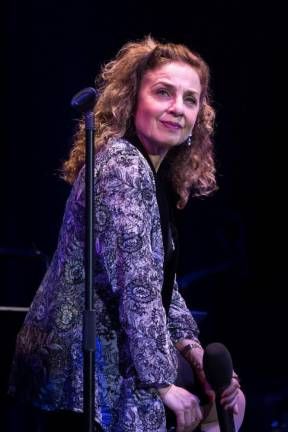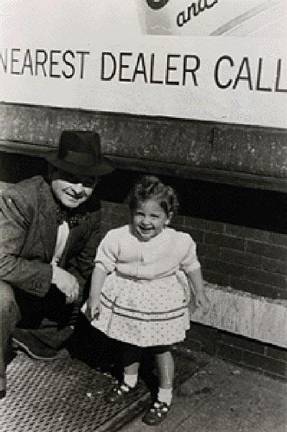'The Unimaginable Did Happen'
Theatrical virtuoso Eleanor Reissa marshals her writing, stage skills and family history as the daughter of Holocaust survivors to make sure the 20th century’s darkest chapter is never forgotten


She’s been dubbed the “Jewish Beyonce” and the “Reigning Queen of the Yiddish Cabaret.” She’s a singer, actress, playwright, choreographer, librettist, translator, memoirist, Tony-nominated director, and master of the Great Yiddish Songbook – and her credits include Broadway, Off-Broadway, regional theater, film, TV, improv and stand-up.
Eleanor Reissa has performed in Carnegie Hall and Town Hall, Paris and Warsaw, and she served from 1998 to 2003 as artistic director of the National Yiddish Theater Folksbiene. That vast creative output is only part of her life story.
The Brooklyn-born, Upper West Sider, product of the city’s public school system and graduate of Brooklyn College, is the daughter of Polish-born Holocaust survivors. She’s also the narrator and host of a new podcast, “Those Who Were There: Voices from the Holocaust,” which taps first-hand testimony from the Fortunoff Video Archive for Holocaust Testimonies at Yale University.
On the eve of the 75th anniversary of the liberation of Auschwitz, Monday, Jan. 27, which is observed as International Holocaust Remembrance Day, we chatted about the imperative to remember, why for decades the victims rarely spoke of the inferno, the horrors her own family endured – and even bringing the dead back to life. Excerpts:
In our first conversation, you said this: “I knew them, I touched them, I loved them, I kissed them.” Who were you talking about?
I was talking about all the refugees, the Jews who lived through the war, whose mother tongue was Yiddish, who loved and lived simply and directly. They were a community of not only relatives but friends of family and were plentiful in my life. They were in the bungalow colony in the Catskills, in the shul, in the grocery store. All over. They once walked the earth, like dinosaurs.
After all this time, why do the survivor stories matter now?
It was such an unspeakable event, such an inhuman event, such an impossible event, that we need to know that it was indeed possible. The unimaginable did happen. The stories in the podcast, told by the people who lived through that nightmare, puts a face on the horror. It shows the humanity of the inhumanity. The crime didn’t happen to faceless numbers. It was the murder and destruction of specific human beings, men, women, children, who loved and were loved, who cooked and painted and sang. They were alive – in the wrong place at the wrong time. What happens when we find ourselves in such a place? These real-life stories honor those who fought like hell to live to tell the tale. It is from them we will learn to beware of the signs of such things happening again, although I suspect we are blind to the marching boots until they march directly to our own door.
Is that why we remember this dark past?
Millions of people, my own father, lived in an unimaginable hell created by mankind, in an indescribably grotesque situation, and that such a thing could happen in a so-called civilized, modern society must always be remembered so it never happens again.
In the blink of an eye, the survivors will be gone. Your podcast offers a last chance to meet them. Tell us about it.
At one time, not so long ago, these survivors walked the face of the earth. You could meet them and speak to them. But they are disappearing. The end of that era is approaching. “Those Who Were There” keeps the voices of the survivors and witnesses alive and offers us the miracle of their company, and with it, their insight and knowledge, their heart and soul. It’s an enormous opportunity, not to be missed, and it’s free and available to everyone.
The survivors we meet endured the worst atrocities on earth. Yet they waited decades to tell their stories. Why?
I think time had to pass before the survivors themselves could actually speak about it. They were broken and ashamed and guilty and bereft. With what words could they speak? Primo Levi came as close as anyone I know in his “What is Man?” The world wasn’t ready either. It didn't want to know. Why? Their own shame? How much real-life horror can one bear?
Your own father, Chaskel Schlusselberg, barely talked of his ordeal at Auschwitz. What do you know of his story?
He really didn’t speak about it. One or two small details. About how he slept on his shoes so they wouldn’t be stolen, and that someone once gave him bread that helped save him. I asked about it, but it was clearly a source of pain to him, so I didn’t want to inflict anymore upon him. I always felt that it was my job to cheer him up, to make his life better. I found out later, years after his death in 1976, that he was in Auschwitz from 1943-1945 and was on the death march, that he had another daughter with his first wife, who were both killed; that he managed to send his son to safety on a kinder transport to England in 1938. Before the war, he was a vibrant, active man. Here in the USA he was a broken man – a sweatshop worker who was always "the other."
Once upon a time, the world turned its back on the Jews. Two words, “Never again,” became a mantra. Are we doing enough to ensure it never happens again?
Clearly not. I’m afraid there are some people who think “never again” only applies to their own people, their own religion or ethnicity. I’m afraid they don’t understand that “never again” applies to those who are made to feel as though they are "others" – strangers on this earth and vulnerable to the cruelties of powerful men.
invreporter@strausnews.com